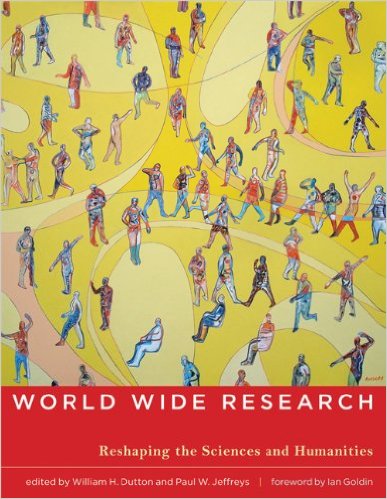
Professor William H. Dutton
Senior Fellow, Advisory Board Member
Bill Dutton was the OII’s Founding Director, a Fellow of Balliol College and the first Professor of Internet Studies at Oxford University.

Advances in information and communication technology are transforming the way scholarly research is conducted across all disciplines. The use of increasingly powerful and versatile computer-based and networked systems promises to change research activity as profoundly as the mobile phone, the Internet, and email have changed everyday life. This book offers a comprehensive and accessible view of the use of these new approaches—called ‘e-research’ — and their ethical, legal, and institutional implications.
The contributors, leading scholars from a range of disciplines, focus on how e-Research is reshaping not only the research process but also, and more important, its outcomes. By anchoring their discussion in specific examples and case studies, they identify and analyze a promising set of practical developments and results associated with e-research innovations.
The contributors explain why and how e-Research activity can reconfigure access to networks of information, expertise, and experience, changing what researchers observe, with whom they collaborate, how they share information, which methods they use to report their findings, and which knowledge is required to do this. They discuss both the means of e-Research (new research-centered computational networks) and its purpose (to improve the quality of worldwide research).
The book is edited by William H. Dutton (Director of the Oxford Internet Institute, Professor of Internet Studies, and Professorial Fellow of Balliol College at the University of Oxford) and Paul W. Jeffreys (Director of IT at the University of Oxford, Professor of Computing, and Professorial Fellow of Keble College at the University of Oxford). The Foreword is by Ian Goldin.
The contributors are: Hal Abelson, Robert Ackland, Roger Barga, Tim Berners-Lee, Christine L. Borgman, Geoffrey C. Bowker, Alan Bowman, João Caraça, Gustavo Cardoso, Annamaria Carusi, Paul A. David, Grace de la Flor, Matthijs den Besten, David De Roure, Matthew Dovey, Ricardo B. Duque, William H. Dutton, Paul N. Edwards, Rita Espanha, Michael A. Fraser, Jenny Fry, Ian Goldin, Wendy Hall, Tony Hey, Steven J. Jackson, Paul Jeffreys, Marina Jirotka, Jane Kaye, Cory Knobel, Julia Lane, Xiaoming Li, Sharon Lloyd, Christine Madsen, Andrew Martin, Sandro Mendonça, Eric T. Meyer, Kieron O’Hara, Savas Parastatidis, Michael Parker, Justine Pila, Tina Piper, Rob Procter, Ralph Schroeder, Nigel Shadbolt, David Shotton, Wesley Shrum, Michael Spence, John Taylor, Mike Thelwall, David Vaver, Andrew Warr, John Wilbanks, Yorick Wilks, Paul Wouters, Marcus Antonius Ynalvez, and Jonathan J.H. Zhu.
“Research of all kinds has been transformed over the last decade. We have discovered the potential of the web for access to literature and data, project management, the dissemination of results, and much else. Yet the effects of these changes have raised questions about our new ways of working. It is time for stock-taking and reflection, and time to consider just what targets we should be aiming for with e-research and e-science. This volume is an important contribution to this project and represents both an introduction and a series of in-depth appraisals. Its contributors, appropriately enough, come from a wide variety of disciplines and backgrounds, but all share an awareness of, and experience with, the state of the art in a fast-moving field. The world of research is liable to be transformed even more in the coming decade, and this book will be an invaluable tool for navigating these uncharted waters.”
Ian Miles, Professor of Technological Innovation and Social Change, University of Manchester
“Research is finally catching up with the World Wide Web. While some humanists and social scientists have been quick to use new web tools in their work, most fields have lagged behind. World Wide Research shows that this is changing. The technologies are altering the access and management of information and making possible new lines of research. Happily, the contributors don’t just assert possibilities; they report on actual research, showing how Web tools are speeding globalization, changing patterns of collaboration, and raising new ethical issues. This book is perhaps the best place to start learning about trends that are reshaping research.”
Craig Calhoun, President, Social Science Research Council